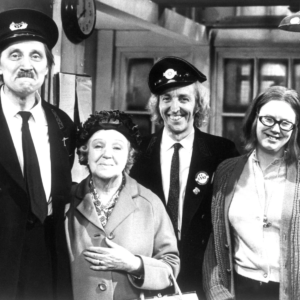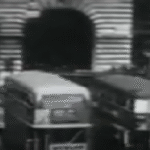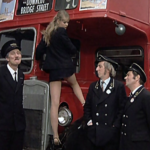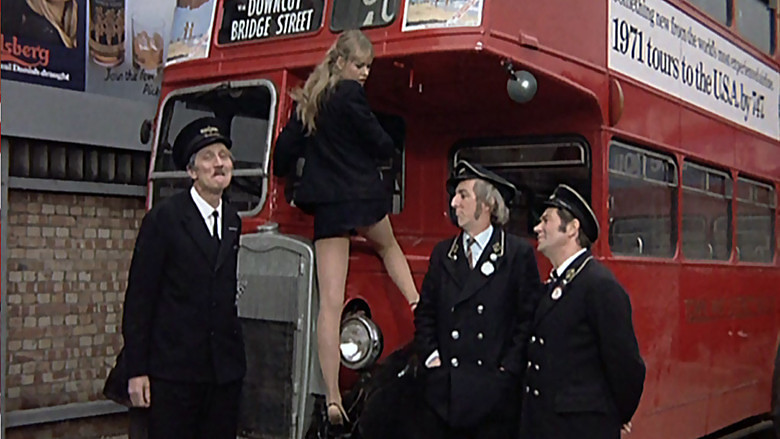‘On The Buses’ was a British television sitcom that originally ran between 1969 and 1973 on the ITV network. The Olive character played by Anna Karen originally appeared in the television series ‘The Rag Trade’ that ran on the BBC between 1961 and 1963. She is thought to be the first ever British television character to transfer from one television series to another. The actor Reg Varney who was Olive’s on screen brother Stan in ‘On The Buses’ also appeared in ‘The Rag Trade’ as Reg Turner the foreman and pattern cutter. ‘The Rag Trade’ was written by Ronald Chesney and Ronald Wolfe and was commissioned by the BBC. When the pair came up with the idea of ‘On The Buses’, they initially approached the BBC again, but the idea was rejected as it was thought there would be no scope for a sitcom based around a bus depot.
They then approached Frank Muir who is better known for the BBC2 television series ‘Call My Bluff’, but at that time was Head of Entertainment at London Weekend Television. Muir liked the idea and the first series of ‘On The Buses’ was given the green light. The programme became a household favourite despite its lack of critical support.
The show appeared for seven seasons generating a total of seventy four episodes. The general plot of the show centred around a ‘chirpy’ bus driver known as Stan Butler (Reg Varney) who lived at home with his mom played initially by Cicely Courtneidge for the first series and for the remaining six series by Doris Hare. Also living in the Butler household was long suffering sister Olive (Anna Karen) and her husband Arthur Rudge (Michael Robbins). Much of the plot development involved Stan and his conductor mate Jack Harper (Bob Grant) attempting to chat up the young female clippies (bus conductors) on their buses. The pair’s attempts to avoid work and chase the young clippies was often to the annoyance of inspector Blake (Stephen Lewis – Don’t Drink the Water) who would constantly shout ‘I ate you Butler’. Much to his annoyance Stan and Jack would refer to Blake as Dracula or Hitler.
 The buses used in the ‘On the Buses’ television series were not Routemaster buses, they were Bristol FLF-type Lodekkas. However, the television series spawned three films called ‘On the Buses’ (1971), ‘Mutiny on the Buses’ (1972) and ‘Holiday on the Buses’ (1973) and the films were said to exist in a different story arc or universe. The buses used in the films were Routemaster buses, as the producers believed that for an international audience, as was the scope of the films, Routemasters would be more easily identified and accepted by the audiences. All through the seven seasons, Olive and Arthur appeared to have not only a loveless marriage but also a sexless one with Arthur constantly spurning Olive’s affections and making excuses not to go for ‘an early night’. This culminated in the childless Olive and Arthur getting divorced in the television series yet at the same time the films saw them married with a child. Not only was the story arc different in terms of the buses used and the relationship between Arthur and Olive but the name of the bus company was changed from Luxton & District to Town & District.
The buses used in the ‘On the Buses’ television series were not Routemaster buses, they were Bristol FLF-type Lodekkas. However, the television series spawned three films called ‘On the Buses’ (1971), ‘Mutiny on the Buses’ (1972) and ‘Holiday on the Buses’ (1973) and the films were said to exist in a different story arc or universe. The buses used in the films were Routemaster buses, as the producers believed that for an international audience, as was the scope of the films, Routemasters would be more easily identified and accepted by the audiences. All through the seven seasons, Olive and Arthur appeared to have not only a loveless marriage but also a sexless one with Arthur constantly spurning Olive’s affections and making excuses not to go for ‘an early night’. This culminated in the childless Olive and Arthur getting divorced in the television series yet at the same time the films saw them married with a child. Not only was the story arc different in terms of the buses used and the relationship between Arthur and Olive but the name of the bus company was changed from Luxton & District to Town & District.







